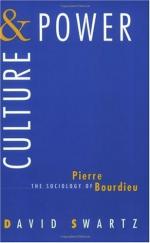|
This section contains 10,048 words (approx. 34 pages at 300 words per page) |

|
SOURCE: McNay, Lois. “Gender, Habitus and the Field: Pierre Bourdieu and the Limits of Reflexivity.” Theory, Culture & Society 16, no. 1 (1999): 95-117.
In the following essay, McNay focuses on the work of Bourdieu and Michel Foucault to examine notions of reflexive identity, characterizing Bourdieu's position as more dynamic and developed.
This article argues that the failure of certain theories of reflexive identity transformation to consider more fully issues connected to gender identity leads to an overemphasis on the expressive possibilities thrown up by processes of detraditionalization. A more sustained examination of questions related to gender, embodiment and sexuality reveals aspects of identity that render it less amenable to emancipatory processes of refashioning. This is not to say that identity is immutable but, by ignoring certain deeply embedded aspects, some theories of reflexive change reproduce the ‘disembodied and disembedded’ subject of masculinist thought.
The issues of disembodiment and disembeddedness are explored...
|
This section contains 10,048 words (approx. 34 pages at 300 words per page) |

|


